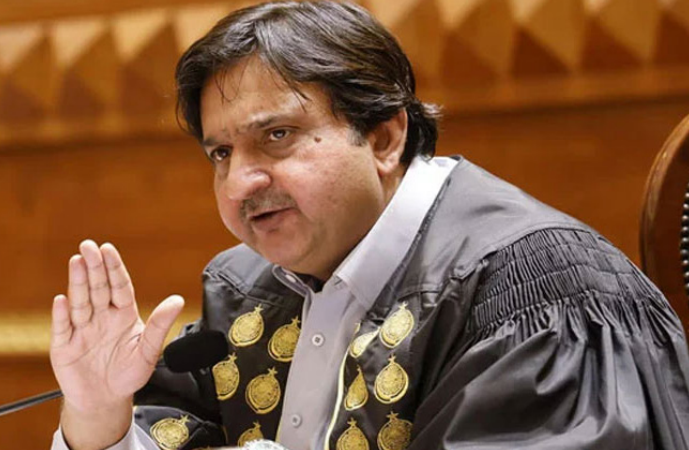Tahir Maqsood Chheena
In parliamentary democracies, dissent is not only expected—it is essential. Legislatures across the world echo with loud arguments, passionate speeches, and at times, unruly disruptions. That is the price of freedom, of democracy, and of representation. Pakistan’s own parliamentary history is rich with such episodes, where opposition benches have vocally resisted ruling party agendas, protested on the floor, and even walked out in defiance. But never before has parliamentary protest been equated with constitutional treason—until now.
The recent events in the Punjab Assembly during the provincial budget session have taken a worrying turn. During Chief Minister Maryam Nawaz Sharif’s speech, opposition lawmakers from the Pakistan Tehreek-e-Insaf (PTI)-backed Sunni Ittehad Council (SIC) engaged in noisy protest, objecting to what they argue is a stolen mandate. The opposition claims that the 2024 elections were rigged in favour of the PML-N, and Maryam Nawaz’s government lacks legitimacy. Their protest, while intense, was not out of place in a parliamentary context. Scenes far worse have unfolded in national and provincial assemblies in the past without sparking calls for disqualification.
Initially, the Speaker of the Punjab Assembly, Malik Muhammad Ahmad Khan, responded within the accepted boundaries of parliamentary discipline. He suspended 26 opposition lawmakers for disorderly conduct and imposed fines on 10 members accused of damaging assembly property. These steps—while stern—fell within the Speaker’s procedural authority. They might have drawn criticism for being heavy-handed, but they were not extraordinary by historical standards.
However, what followed has rightly alarmed legal and democratic circles. The Speaker escalated the matter dramatically by approaching the Election Commission of Pakistan (ECP), seeking the disqualification of the suspended lawmakers. This, by any measure, is an unprecedented and disproportionate response to parliamentary protest. It crosses the line from maintaining order to suppressing dissent.
Speaker Khan has cited “gross misconduct,” “violation of oath,” and “constitutional breach” to justify the move. Yet legal experts have overwhelmingly rejected this framing. Parliamentary disorder, even when aggressive or unruly, does not amount to a constitutional violation. There is a clear distinction between procedural misconduct and a breach of constitutional fidelity. The Speaker’s interpretation blurs this line dangerously—and perhaps deliberately.
Why has such an extreme step been taken now? The answer lies not in the Constitution, but in politics. The protest was not against the budget itself; it was against Maryam Nawaz Sharif personally. She is not just the first woman to serve as Chief Minister of Punjab, she is also the political crown jewel of the PML-N. Her leadership has been projected as a “red line” by the ruling party. The Speaker’s move to seek disqualification appears less about preserving parliamentary sanctity and more about defending Maryam Nawaz’s ego. The response has all the hallmarks of political appeasement.
This raises a critical question: is the Speaker acting as the impartial custodian of the House or as a political loyalist safeguarding the party leadership? His role demands neutrality, yet his actions suggest allegiance. A Speaker is expected to manage disorder with fairness and objectivity—not to weaponize the rules of the House against those challenging the ruling elite.
The Pakistan People’s Party (PPP), a coalition ally of the PML-N, has also questioned the Speaker’s disproportionate response. Their concern is valid: would this escalation have occurred if the protesters had interrupted someone other than Maryam Nawaz? The selective nature of this outrage exposes a broader problem in our political culture—where loyalty to personalities overrides loyalty to principles.
This episode also exposes the fragile state of Pakistan’s democratic norms. It reflects an increasing tendency to conflate criticism of power with rebellion, and opposition with enmity. In a healthy democracy, the right to protest—especially in the legislature—is sacred. Reducing every disagreement to a threat, and every protest to sedition, is the hallmark of authoritarian thinking.
Furthermore, the Speaker’s decision to involve the ECP sets a dangerous precedent. If parliamentary disorder becomes grounds for disqualification, every future ruling party will have the means to silence dissenting voices through institutional manipulation. It will allow majorities to criminalize opposition—not for breaking the law, but for challenging power. This risks transforming the legislature from a platform for democratic debate into a theatre of controlled obedience.
Legal scholars have already warned that the Speaker’s move is likely to be struck down in court. The Punjab Assembly Rules only allow temporary suspension of members—not their disqualification. The Speaker is not constitutionally empowered to recommend disqualification on such grounds. His attempt to stretch his powers beyond their lawful bounds reveals an intent that is more political than procedural.
This entire episode also carries symbolic weight. PTI lawmakers, who already claim that their mandate was robbed, are now being threatened with removal for expressing that very grievance inside the Assembly. If democracy means anything, it must protect the right to protest—even when it is inconvenient, loud, or uncomfortable for those in power.
The essence of parliamentary democracy lies not in perfect order, but in the acceptance of dissent, however messy it may be. To punish elected representatives for expressing the voice of their voters is not just undemocratic—it is a betrayal of the very institution the Speaker claims to protect.
As custodians of the Constitution, legislators must understand that true loyalty lies not with individuals, but with democratic ideals. The Constitution—not a chief minister’s reputation—must be the only red line in any democracy. By attempting to disqualify legislators for disrupting a speech, the Punjab Assembly has crossed into dangerous territory.
In the end, this controversy will not be remembered for the protest itself, but for how the state responded to it. If the goal was to defend Maryam Nawaz Sharif’s authority, it has come at the cost of democratic credibility. The path Pakistan needs is one of inclusion, tolerance, and open debate—not repression of voices that dare to speak up. Democracy may be noisy, but silence enforced through fear is the real threat to the system.
















